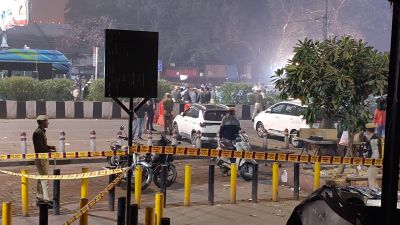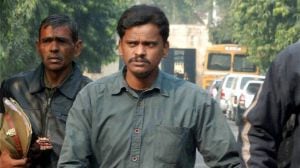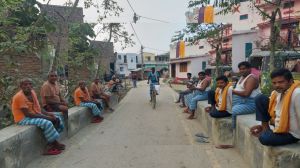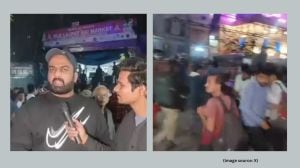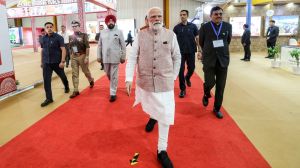The perennially moaning elite
Squeamishness of the Indian mind to identify, and realise, as to what constitutes the parameters of national security concerns and intere...

Squeamishness of the Indian mind to identify, and realise, as to what constitutes the parameters of national security concerns and interests is one of the enduring mysteries of this half-century of freedom. Political and administrative freedom has yet not been replicated in the intellectual field. And the vast majority of the political leadership in this country, aped by a similarly large constituency of the perennially unhappy, have still not understood the globalism of national security interests. While being parochially national, security interests are intrinsically linked to global factors. It is this curious interplay in the dichotomy between the national and the global which defeats the ability of the Indian mind to think India first’. The year 1998 has already provided two distinctive examples of this great Indian failure. The Shakti series of nuclear tests at Pokharan, and now the air strikes by the United States on terrorist training camps in Khost, Afghanistan. In the first case the imagination ofmany aggrieved Indian truly ran riot. Rootless cosmopolitan Indians went ballistic, and vivid accounts of what a nuclear winter would be like came to be recounted in print, prose and parties. A fiction writer, much feted in two English-speaking nuclear weapons states, thought her world had died because India tested nuclear weapons, and so has decided to secede.
What India did was to remove the fig leaf that it had been carrying around since 1988 when nuclear weapons were first inducted. But then the fickle Indian middle class likes things to remain under wraps – kiss but don’t tell. The same is with the truly bizarre reaction to the US air strikes. Condemnation from all quarters, with the government also unwilling to stand apart and be counted for taking a position based on national security interests. This urban Indian intellectual laziness was most evident in the argument that the air strikes would alienate the Muslims, as though faith makes international terrorism is of little concern to a follower.This is fig-leaf communalism, believing in the grotesque thesis that Muslims are unaffected by international terror, to the point that they would condemn actions taken against this transnational network of murder and misery. But then this great Indian opposition to the activities American is rooted in a deeper malaise. Those in government, or who have been there, and their lackeys in intellectual subsidies actually stopped thinking since the time Jawahar Lal Nehru did. Whether it was in politics, economics or security policies, urban India, the most materially subsidised of its citizenry, has swallowed hook line and sinker whatever drivel that has been offered to them. This sloth, to be fair to the late prime minister, has deeper civilisational causes, with most Indians comfortable with the thinking done by the badshah. This thinking then came to be done by white traders, and thereafter officials representing their queen in London.
A native intelligentsia was allowed to be developed, but Indians were alwayskept out of thinking security interests. There has, therefore, never been an Indian inspired perspective or doctrine on national security since the crafty Kautilya wrote Arthashastra. Lord Curzon was the last administrator who perceived Indian security interests to encompass Aden, the Oxus, Lhasa and up to Siam. But then he was thinking for his queen, and her party line. Since Curzon, a free India has allowed its security vision to shrink alongwith that of its political leadership. Piffle like territorial integrity’ is taken to be the country’s security policies and interests. And in that shrunken plight Indians cannot cope with the deep links between the country’s security interests and what happened at Khost. What the US did was to follow the lead to a security threat to their nation, and in that action was great benefit for India. Links between the terrorists operating in India and their friends and masters now stand exposed. Despite loosing so many lives over the years, India never thought it worthwhileto cure the cancer in its roots. The spinelessness of the Indian intelligentsia and the political leadership is unique in the annals of 20th century history. Here is a country, being bled to the bone, with its women and children massacred in the most bestial manner, and its boys coming home in body bags, and its urban elite continues to think, speak, and produce litter.
That insensitivity comes from one basic fact the urban Indian elite has no stake in the protection of India’s national interests and security. It has no stake primarily because it has not shed its blood in the vale of Kashmir or in the Northeastern states. The groovy and the well-connected have not received one of their own in a coffin, or in the form of a dog-tag that was once one of their own. When the intellectually and materially subsidised urban Indian elite begin to feel the loss of their own blood, only then will the country commence the journey to realising its national security objectives. Why blame the white man for remainingunmoved by the constant shedding of Indian blood, when the Indian has yet not been affected? The white man will only become aware of the tragedy if first the Indian is, and moved enough to do something about it. But India is today a society divided between the permanently moaning and those in mourning. The former have already seceded.



- 01
- 02
- 03
- 04
- 05


